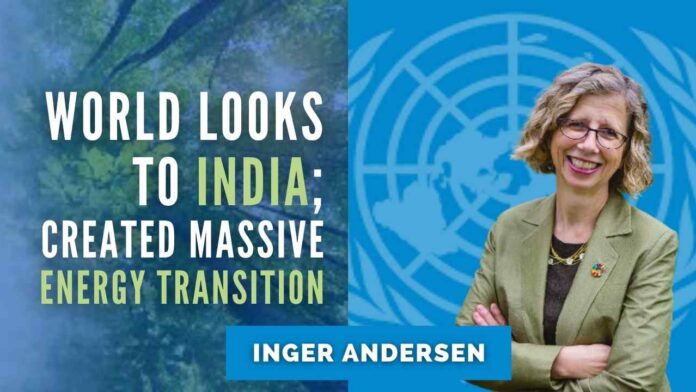
UNEP Chief praises India’s ‘bold’ pledges and actions
On Saturday, United Nations Environment Programme’s (UNEP) Executive Director, Inger Andersen, said that the world looks to India on several fronts. In recent years, it created a massive expansion in renewable energy. India’s effort at promoting LED lighting for example is a huge success story. This has brought big savings in power use, greenhouse gas emissions, and household bills.
Inger Andersen is a Danish economist and environmentalist and was appointed as an Executive Director of the UN Environment Programme on June 15, 2019. Prior to joining UNEP, Andersen was the Director-General of the International Union for Conservation of Nature (IUCN) and held various leadership roles at the World Bank.
Andersen spoke ahead of the resumed fifth session of the UN Environment Assembly (UNEA-5) – the world’s parliament on the environment. The session will see representatives of the 193 Member States of the United Nations, business leaders, civil society, and environmentalists in Nairobi, Kenya. The resumed session will run till March 2 with countries attempting to find solutions to some of the biggest challenges facing the earth.
She praised India’s ‘bold’ pledges and actions and said that India has also taken steps to control plastic pollution, including bans on single-use plastic and strengthening extended producer responsibility. India has also committed to restoring 26 million hectares of degraded land by 2030.
She believes India, like every nation, must do more. “And doing more is in the best interests of the entire nation. IEA (International Energy Agency) studies show that a transition to net-zero carbon can catalyze new industries, create millions of jobs, and drive trillions of dollars of economic value,” she said.
Quoting a recent World Economic Forum estimate, she says India’s decarbonization journey represents a $15 trillion economic opportunity by 2070. “This journey could create as many as 50 million net new jobs. With an estimated 10 million Indians have lost their jobs from the second wave of the pandemic, investing in ecosystem restoration becomes even more important for sustaining household incomes.
“As India assumes the leadership of the G20, here too we see a big role for the country to make a massive push for sustainability. After all, the G20 accounts for 78 percent of global emissions. When the G20 moves, so too will the world.”
On India’s announcement to eliminate 20 identified single-use plastics in the country from July 1, the UNEP chief said, “Plastic pollution is a global scourge that we must all act on, and in so doing, we tackle climate change, we tackle biodiversity loss, and we tackled pollution and waste.”
This month India notified extended producer responsibility (EPR) rules for plastic packaging, with an aim to collect, and recycle plastics, and to ensure the use of recycled plastics in packaging. It also provided clear targets for businesses to move towards sustainable plastic packaging.
Responding to this she said, “This is promising but we all know that plastic pollution is not a problem we can recycle our way out of. We need a system change that addresses the full life cycle of plastics, from the extraction of raw materials to alternatives to improved waste management. We need to be innovative and eliminate products that are unnecessary, avoidable, or problematic. Design products for reuse and recycling and ensure this happens. Remove hazardous additives.”
The Assembly will consider other critical issues, including chemical waste and nitrogen management, nature-based solutions and biodiversity and the circular economy.
The Assembly will be followed by a special session, called UNEP@50, to be held on March 3-4 to commemorate the 50th anniversary of the establishment of UNEP. The special session will be held under the overall theme of “Strengthening UNEP for the implementation of the environmental dimension of the 2030 Agenda for Sustainable Development”.
Founded in 1972 following the landmark UN Conference on the Human Environment, UNEP was conceived to monitor the state of the environment, inform policy-making with science, and coordinate responses to the world’s environmental challenges.
[With Inputs from IANS]
PGurus is now on Telegram. Click here to join our channel and stay updated with all the latest news and views
For all the latest updates, download PGurus App.
- Will ‘exit India’ if forced to break encryption: WhatsApp to Delhi High Court - April 26, 2024
- Seers of Ayodhya react sharply to Rahul, Priyanka’s ‘proposed’ visit to Shri Ram Mandir - April 26, 2024
- PM Modi launches another scathing attack on Congress; says ‘Rajiv Gandhi scrapped inheritance law to save family property’ - April 25, 2024










